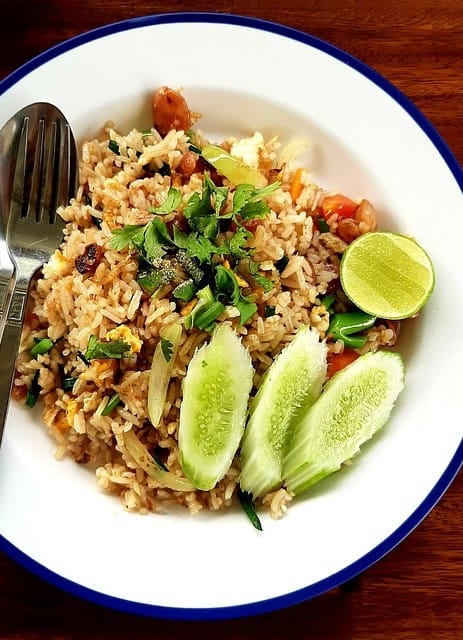The Only Fried Rice Recipe You’ll Ever Need: Simple, Flavorful, and Better Than Takeout
If there’s one dish that brings comfort, flexibility, and flavor together in a single skillet, it’s fried rice. Whether you’re craving a quick weeknight dinner or searching for a creative way to use leftover rice, a good fried rice recipe checks all the boxes. It’s warm, savory, packed with texture, and completely customizable based on what’s in your fridge.
But here’s the thing not all fried rice recipes are created equal. Some are too bland. Others turn out soggy or mushy. Maybe you’ve even tried a few and thought, "Why can’t I get it right at home like they do at restaurants?" That’s where this post comes in. We’re about to unlock the secrets of making homemade fried rice that’s restaurant-worthy crispy in just the right places, full of flavor, and endlessly satisfying.
In this guide, you’ll not only learn how to make fried rice step by step, but you’ll also get insider tips, smart swaps, and answers to common questions. Whether you’re making it for the first time or trying to perfect your technique, this is the easy fried rice recipe you’ll come back to again and again.
Why You’ll Love This Homemade Fried Rice
There’s a reason Chinese fried rice is one of the most ordered takeout items across the globe. It’s fast, filling, and flavorful. But making it at home has some serious advantages.
It’s incredibly fast
Once your rice is cooked (or ideally, chilled), the rest of the recipe takes less than 20 minutes from start to finish. That’s faster than waiting for delivery.
You’re in control of the ingredients
Restaurant chinese rice can often be high in sodium, oils, or added MSG. When you make your own, you choose the quality and quantity of each ingredient. Want low-sodium soy sauce? Done. Prefer brown rice over white? Easy. Need it gluten-free or vegetarian? No problem.
It’s perfect for leftovers
Have day-old rice, a few stray veggies, and some leftover rotisserie chicken? You’re already halfway to dinner. The versatility of fried rice recipes means you can use what you have on hand, making it both budget-friendly and zero-waste.
It tastes better than takeout
That’s a bold statement but when you get the texture and seasoning right, there’s no comparison. The key lies in understanding the right technique, and that’s exactly what we’re here to teach.
The History Behind Chinese Fried Rice
To truly appreciate a dish, it’s helpful to understand where it came from. Chinese fried rice dates back over a thousand years to the Sui Dynasty. It began as a clever way to repurpose leftover rice and meat, cooked together in a wok over high heat. What made it stand out was the transformation of simple ingredients into something aromatic and deeply satisfying.
Today, fried rice recipes have evolved across cultures. From Thai pineapple fried rice to Indonesian nasi goreng and Japanese yakimeshi, every region has its own take. But at its heart, the classic Chinese rice dish remains one of the most iconic and beloved around the world.
What Makes This the Best Fried Rice Recipe
The term “best” gets tossed around a lot, so let’s break down why this version deserves that title.
Texture is king
Many people end up with mushy rice because they use freshly steamed rice. For the best fried rice recipe, you want rice that’s dry and slightly firm. Day-old rice is ideal. It fries better and doesn’t clump.
Layered flavor
Instead of dumping all the ingredients in at once, this recipe builds flavor in stages. You’ll cook the aromatics, sauté the vegetables, crisp the rice, and fold in the eggs at just the right time.
Balanced seasoning
With just the right amount of soy sauce, oyster sauce, and sesame oil, the seasoning in this recipe is deeply savory but never overpowering. The result is a well-rounded flavor profile that tastes just like restaurant-style Chinese fried rice, but even fresher.
Essential Tips for Perfect Homemade Fried Rice
Before we dive into the recipe, let’s cover a few must-know tips that will help you master the art of fried rice.
Use cold, day-old rice
This tip is repeated often and for good reason. Fresh rice is too moist and soft, which leads to soggy results. If you don’t have day-old rice, spread hot rice on a baking sheet and refrigerate it for 30 minutes. This quick-chill method mimics the dryness of older rice.
Don’t overcrowd the pan
The key to achieving that subtle crisp on your rice is giving it room to fry. Use a large wok or non-stick skillet and avoid overloading it with too many ingredients at once.
High heat is your friend
Fried rice recipes benefit from a quick cook over high heat. This helps the rice get toasty and gives you that authentic wok-tossed flavor.
Prep everything before you start
Once the oil is hot and the pan is sizzling, things move fast. Have all your ingredients—chopped veggies, scrambled eggs, soy sauce, rice ready to go before you begin cooking.
Customizing Your Easy Fried Rice Recipe
One of the best things about learning how to make fried rice is how easily you can adapt it to fit your taste, diet, or what’s in your kitchen.
Swap the vegetables
No peas? Use corn, bell peppers, cabbage, or broccoli. Pretty much any quick-cooking veggie will work. Frozen vegetables are a great shortcut, too.
Add protein
Boost the meal with diced chicken, shrimp, tofu, or beef. Stir-fry your protein first, then remove it from the pan while cooking the rest of the dish. Add it back in at the end.
Switch up the rice
Classic Chinese rice uses jasmine or medium-grain white rice, but brown rice or cauliflower rice also work well. Even quinoa is a great gluten-free option.
Spice it up
Love heat? Add some red pepper flakes, diced chili, or a drizzle of sriracha at the end.
What Makes Chinese Fried Rice Different From Other Fried Rice?
While fried rice exists across Asia and beyond, Chinese fried rice is distinct in a few ways.
Neutral seasoning is used instead of bold spice blends. The flavor comes mainly from soy sauce, garlic, and scallions.
The egg is cooked separately and folded in later, instead of mixing the raw egg directly into the rice. This preserves the texture and flavor of the egg.
The dish maintains a light golden color with a clean, savory taste, unlike some other variations that are heavily seasoned or dark from soy sauce.
Common Questions About How to Make Fried Rice
Can I use freshly cooked rice?
You can, but it’s not ideal. If you must, let it cool fully and refrigerate it uncovered for at least 30 minutes to dry it out before frying.
What oil is best for fried rice?
Use oils with a high smoke point and neutral flavor such as vegetable oil, canola oil, or peanut oil. For finishing, a dash of toasted sesame oil adds incredible depth.
Why is my fried rice soggy?
Usually, this happens because the rice is too wet or the pan wasn’t hot enough. Always use cold, dry rice and cook in batches if necessary to maintain high heat.
Can I make it ahead of time?
Yes. Fried rice stores well in the fridge for 3 to 4 days and can be reheated in a skillet or microwave. It even freezes well just let it cool completely before storing it in airtight containers.
The Takeaway: Your Go-To Guide to the Best Fried Rice Recipe
Whether you're cooking for one or feeding a crowd, fried rice is a smart, satisfying, and seriously tasty choice. It’s no wonder this dish has stood the test of time, from ancient Chinese kitchens to modern stovetops around the world.
When you master the basics, the possibilities are endless. You can go classic with peas and carrots, add bold flavors with kimchi or curry powder, or toss in last night’s leftovers to make something brand new.
The beauty of a truly great fried rice recipe is in its simplicity. With just a few key techniques and pantry ingredients, you’ll transform cold rice into a comforting, crave-worthy meal. It’s quick. It’s easy. And it’s about to become your new favorite weeknight dinner.
So the next time you wonder how to make fried rice, skip the takeout menu and grab your wok instead. You’re just 20 minutes away from a bowl of the best fried rice recipe you’ve ever tasted.


